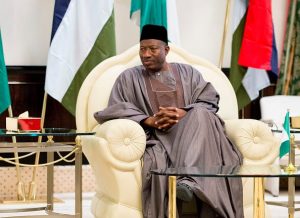
Contemplating the puzzle?
The elaborate efforts of Dr. Goodluck Ebele Jonathan, immediate past president of the Federal Republic of Nigeria to build himself up as a statesman rather than the clueless bird of passage ascribed to him might be suffering a severe setback over the Malabu oil deal. Italian investigators have amassed so much detail about the transaction. Although Dr Jonathan was not the express target of this exercise carried out in pursuit of the minimum sanity requirement of their own society, the EU as well as the global context of contemporary international finance, many players outside Milan/Italy such as Jonathan are also covered. It is not clear if Dr Jonathan is aware of how much detail is circulating in those quarters, including among global finance and anti-corruption INGOs such as Finance Uncovered, Transparency International, Global Witness, among others. The implication is that it is now GEJ/GLJ’s words against a whole constellation of actors out there.
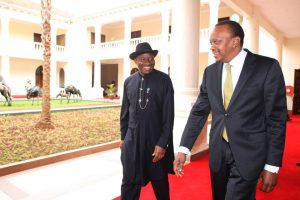
Dr Jonathan with President Uhuru Kenyatta of Kenya
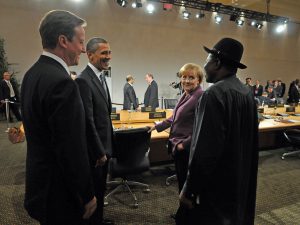
Dr Jonathan with world leaders of his time
The former Nigerian president is, therefore, not helping his case when his first reaction is to centralise his person as being under attack. In attributing the story to those who are uncomfortable with his imaginary rise in international profile, he was addressing the Nigerian audience instead of speaking to the external actors out with enough data that can land him in real trouble. Even if his profile was rising but comes against Shell literarily testifying against him, then that profile is anything but rising. Shell is not just an oil company but a global player with tremendous power resources and a vast audience. In any case, someone such as Fabio de Pasquale who supervened much of the investigations over the years from Milan has dealt with others whom our own GEJ cannot claim superiority in global standing, including Pasquale’s own former Prime Minister, Silvio Berlusconi and governments of other countries.
That’s the quarter GEJ/GLJ has to worry about because it is unlikely that any Nigerian media, civil society, intelligence agencies or courts would initiate and sustain investigation into a Malabu oil deal type. It is not necessarily that these actors are together with corruption but the Nigerian environment is not only disapproving of that, it is dangerous. This is not to talk of the basic technical capacity for that. If the prosecutors in Milan can take on Shell, ENI and their counterparts across the world, then GEJ/GLJ needs to bother about that angle more than the home audience. This is not to suggest that the Nigerian side may be any less hostile to corruption. The House of Representatives has compiled its own document. Documents can disappear in Nigeria such as Okigbo Report but the environment now might be such that this may not happen. He, therefore, has a challenge in which, head or tail, he could be the loser. If he attends the session with the House of Representatives, he has to answer the questions. If he refuses to attend and probably finds a cover in law for that, he would not only be suggesting silence as consent, he would also be complicating things for himself. So, however seen, the Malabu oil deal is a continuation of the story of Dr. Goodluck’s exploration of power.
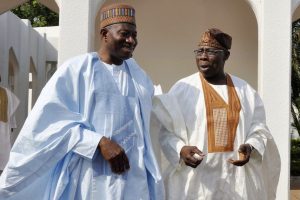
Dr Jonathan with former President Obasanjo who is substantially the architect of his, (Jonathan)’s exploration of power before parting ways with him afterwards. Obasanjo has personally and sharply reacted against Bello Adoke’s insinuation of his approval of Malabu Oil deal
Two issues stick out in this case. One is the sealing of the deal at a time Dr Jonathan was the president, which means he was the ultimate approving authority and must necessarily know a thing about it, even if they were not the technical details. Instructively, the House of Representative’s investigation says that the former president could not claim ignorance of the facts leading to the payout culminating in a huge loss of revenue for the country. Before the House of Representatives’ report, Bello Adoke, GEJ/GLJ’s Minister of Justice, has been reported as saying that the negotiation and the payment were in the interest of the Nigerian people.
Meanwhile, the UK court which ruled on the tussle between Malabu Oil and the State has said, inter alia, that “It is of note that Malabu had paid, (if anything) only a very small proportion of the sum which it received for this licence. Therefore, a sum of approximately, $1bn for exploration right of OPL 245 was paid, not to the Nigerian people for whom they belonged but to Malabu”. This was in 2015, much, much earlier than the current convergence. The gap between Adoke’s reported statement and the analogy drawn by the UK court is a huge one. Here again, we come face to face with that old question: what did the ex-president know and when did he know them about Malabu oil deal?

Fabio de Pasquale who has supervened much of the investigations on Malabu oil. This was his picture in the London Observer March 5th, 2017
The second issue is the specific case of whether GEJ/GLJ collected over $200m payout from the $1.1bn payment. On this question, we are back to the prosecutors, Shell and Global Witness. That is aside from other agencies of the British, American and the Swiss states as well as global banks in the UK and Switzerland. In this context, it bears asking whom GEJ/GLJ was talking to in his statement last Tuesday when he asked how he could be implicated in a deal that predated his regime. That didn’t sound intelligent at all. 2010/2011 turned out the climax of a story that started in 1998 but 2010/2011 happened to be the years of Dr Goodluck’s coming of age in power terms.
All in all, it makes the dialectics of power in Nigeria such a miserable spectacle: people struggle so much for power only to climb directly from there to being linked to one deal or another. Today, it is Dr. Goodluck Jonathan that is literarily in the dock. Who knows who would be next tomorrow? It is to be feared that GEJ/GLJ might not go down alone, should it come to that.
When this analysis is stretched to the class level, it raises the question of how a generation could, collectively, with only few exceptions, steal their own people blind over such a prolonged time? The late Professor Sam Aluko made it clear that any Nigerian head of state is already a rich person without stealing a kobo from government resources. To a lesser extent, this is applicable to ministers, governors, local government council chairpersons and heads of extra ministerial departments. So, why do they steal? Is this the African in them or postcolonial influence or a specifically Nigerian trait?
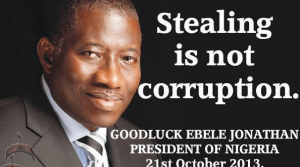
Now, the former president might elaborate whether Malabu is in the category of stealing, corruption or something else altogether
And why do they steal without even heeding warning signs such as Buhari in 1983/5, Nuhu Ribadu in 2003 and the return of Buhari in 2015? How are those who survive the current phase sure they would survive the next Buhari or Ribadu, warts and all? But, even if the Malabu Oil deal would exhaust GEJ/GLJ’s Goodluck, that does not mean he shouldn’t sharpen his communication meanwhile. It cannot be otherwise in a story in which History is unfolding in its complex and contradictory way, involving Nigeria and the African identity on a global scale.




























